#james clear
Text
11 Lessons from the book Atomic Habits 🌟
"Atomic Habits" focuses on incorporating small, consistent habits into our lives to bring about significant change over time. The book introduces a four-step model for building habits, emphasizing cues, cravings, responses, and rewards. It also guides you in overcoming bad habits and self-limiting beliefs, demonstrating how simple habits can lead to substantial progress toward our goals.
Lesson 1: Habits Over Hobbies: You are not inherently bad at your hobbies. Instead, it's the lack of consistent habits that has held you back.
Lesson 2: Identity Matters: Our self-image greatly influences our habits. While it's important, you shouldn't let it hinder your growth.
Lesson 3: Stacking Habits: The concept of habit stacking involves adding a new behavior to an existing habit, which can help you build a more effective morning routine.
Lesson 4: Embrace the System: Rather than solely focusing on goals, it's important to love the process—the journey itself. It's about embracing the system that leads to progress.
Lesson 5: Something is Better Than Nothing: Even small efforts are valuable. The "Two-Minute Rule" encourages starting new habits that take less than two minutes.
Lesson 6: Overcoming Boredom: Staying motivated in habits requires keeping them interesting and within the right level of challenge. "The Goldilocks Rule" emphasizes that tasks on the edge of our abilities are most motivating. Habits won't always be exciting, and that's okay.
Lesson 7: Bouncing Back from Misses: Missing a habit occasionally is normal, but missing it twice can turn into a new habit. The key is to rebound quickly, maintaining the compound gains from previous good days.
Lesson 8: Shaping Your Potential: Our genes affect what we're good at and the chances we get. Instead of feeling stuck by genes, we should use our strengths. Special traits are like superpowers. Questions in the chapter help us find what we care about. Quotes remind us to focus on self-improvement, not comparing. Genes alone don't bring success; effort matters. Genes give hints, but we shape our success by using our strengths.
Lesson 9: Creating a Supportive Environment: Our surroundings are important. If we change our environment to match the habits we want, we're more likely to succeed. By setting up our space to help our habits, we can make good habits easier. People often limit themselves by thinking they can't do better. He also says that just luck doesn't explain success – hard work does. Whether it's moving stuff around or using visual reminders, these changes can really help us succeed in the long run.
Lesson 10: Creating or Breaking Habits: The Four Steps
These four steps are the foundation upon which many of his ideas are built. They are not only applicable to creating positive habits but also to breaking negative ones.
Cue: This is the trigger that initiates a behavior. It can be a specific time, location, emotional state, or preceding action that prompts your brain to start a habit.
Craving: Craving is the motivation or desire behind a habit. It's the feeling that drives you to engage in the behavior triggered by the cue. It's important to understand the underlying craving to effectively change a habit.
Response: Response refers to the actual behavior that you perform as a result of the cue and craving. This is the action that you take in response to the trigger and motivation.
Reward: Rewards are the positive outcomes or feelings that you associate with completing the habit. They reinforce the habit loop by making you more likely to repeat the behavior in the future.
He explains that these four steps form a habit loop, where each step is interconnected. The loop starts with a cue, followed by craving, which leads to a response, and ultimately ends with a reward. If any part of this loop isn't satisfying, the habit is less likely to stick.
Lesson 11: Success is a product of daily habits and overnight success is not overnight:
Success is not a result of overnight transformations but is instead rooted in the daily habits we cultivate. By recognizing the power of consistent, incremental actions, we can build a solid foundation for lasting success. This perspective challenges the allure of instant success and encourages us to focus on the journey of continuous improvement through daily habits.
#atomic habits#james clear#best seller books#bookshelf#booksbooksbooks#personal improvement#personal development#habits#personal growth#self improvement#self help#self awareness#self love
1K notes
·
View notes
Text
“When nothing seems to help, I go and look at a stonecutter hammering away at his rock, perhaps a hundred times without as much as a crack showing in it. Yet at the hundred and first blow it will split in two, and I know it was not that last blow that did it—but all that had gone before.”
James Clear, Atomic Habits
#atomic habits#james clear#bookblr#bookish#book quotes#books#quotes#bookstagram#booktok#book tumblr#reading#book club#book lover#bibliophile#bookworm#book worm#readers of tumblr#booklr#book community
127 notes
·
View notes
Text
"Each day is a new battle to say yes to what matters and say no to what doesn’t. Focus is a practice."
James Clear
336 notes
·
View notes
Text




How to Keep a Routine without Motivation.
There are Four Laws of Behavior Change in the book, Atomic Habits. But today, I will be focusing on the Third Law: "Make it Easy".
You need a cue to trigger the habit loop.
It means in order to stick to a habit, you have to lessen the friction. Just like an alarm clock.
Throughout my self-transformation journey, I have had my fair share of trial and error and I will be sharing the system I built that has worked for me to achieve my intentions of the day.
Notion Recurring Tasks
You have probably heard stories about 'Notion being the best productivity app'. Notion is indeed the second-brain system where you can do a lot of things. It is versatile and easy to use since it syncs on both desktops and phones. But I have not seen anyone who talked about this new feature that helped me accomplish all my tasks and gave me more free time to achieve my higher self.
This has been the best system I built that is extremely helpful to my leveling-up journey. I was able to accomplish a lot of tasks and have more free time to achieve my highest self.
GUIDE: HOW TO CREATE A RECURRING TO-DO LIST
First, pick a task that you know you will be doing weekly, monthly, or yearly.
For example, every month you want to create a Monthly Workout Planner:
On your page, type /gallery and click the Gallery view.
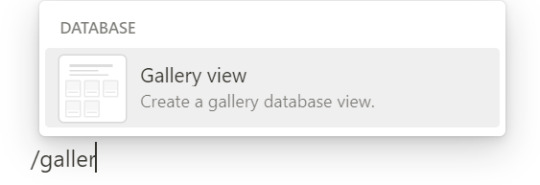
2. Click the drop-down arrow on the upper right side and click "New Template"


3. Type your recurring task
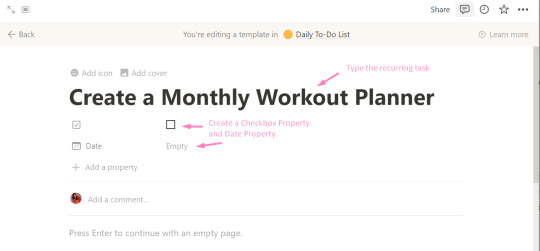
4. After that, click "Back" and Click the 3 dots to choose the frequency of the reminder.

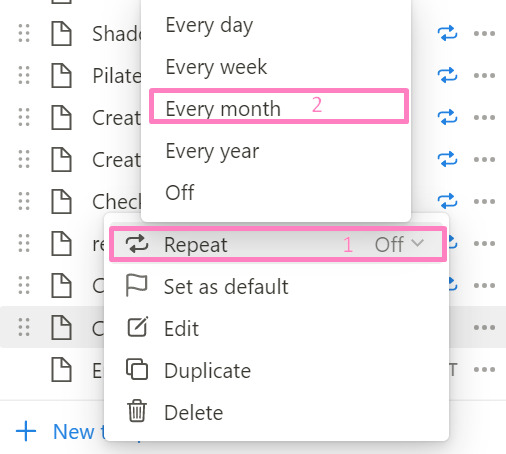
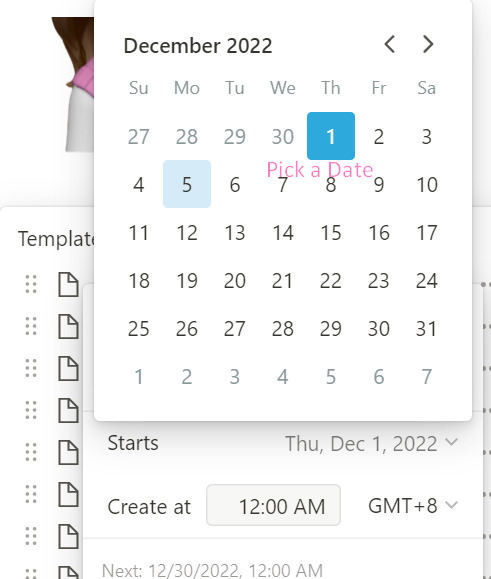

5. Your task will appear automatically on the specific day you set.
Note: You should check your daily to-do task every day because the app doesn't have a feature yet to remind you of the recurring task

WHAT SHOULD I PUT ON MY RECURRING TASK?
I do tasks based on the planetary ruler of the day.
Astro girl coming in...
Have you ever wondered why a lot of people don't like going to work on Mondays? It is because Monday is ruled by the moon. The energy of the day is encouraging us to rest and take things slow.
Now, I'm not saying you shouldn't show up at work or sit on your couch for the whole day! It's about doing prioritized tasks intentionally and not putting too much on your plate. However, if you feel like doing a lot of things on Monday then do it and don't waste your energy!
I like doing Yoga, Meditation, and Journaling every Monday to honor the Moon so I put them on a recurring task.
Tuesday is ruled by Mars. It's good to keep things fired up by working out and accomplishing a lot tasks as possible
Saturday is ruled by Saturn so it is the best day to structure and plan for the next week, clean, and change beddings.
and so on...
This is a wonderful guide on how to organize your week based on the energy of the day.
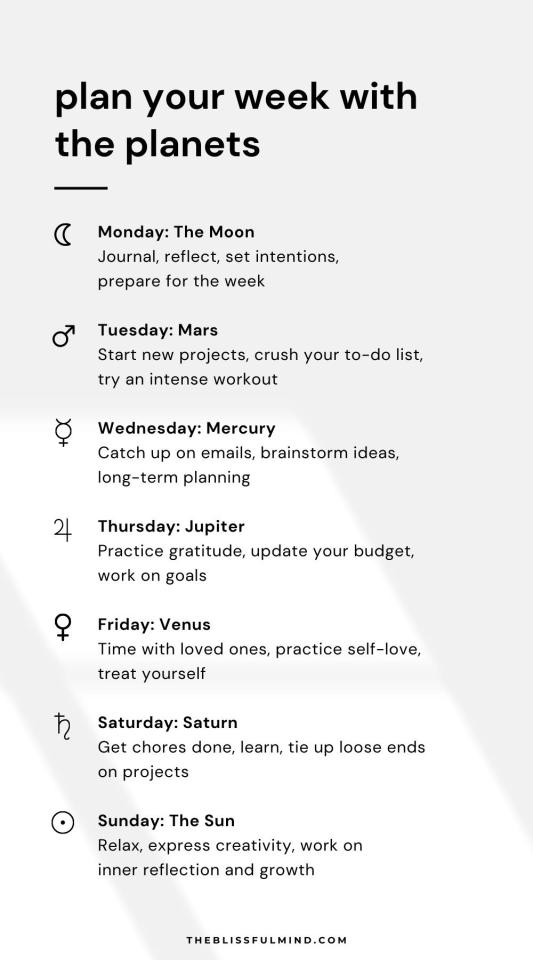
Source: The Blissful Mind
#daily routine#routine#productivity#motivation#get motivated#mindset#self-help#self development#astrology#planetary rulers#days of the week#weekly routine#monthly routine#notion#tasks#discipline#atomic habits#james clear#self help books#self development books#psychology#self improvement
269 notes
·
View notes
Photo

james clear
11 notes
·
View notes
Text
You don’t need all the answers right now. New paths will reveal themselves if you have the courage to get started.
James Clear
17 notes
·
View notes
Text
"On the ground, a rock is just a rock. But when moving at high speed through the atmosphere, a rock becomes a meteor—alive with fire and burning bright.People are not so different. Without activity, we are lifeless and dull. When moving fast and taking action, we come alive."
~James Clear
369 notes
·
View notes
Text
"Cuando te enamoras del proceso más que del producto final, no tiene que esperar hasta el desenlace para permitirte ser feliz."
— James Clear (2018)
#frases#frases en español#james clear#habitos#habitos atómicos#habitosatomicos#libros#frases de libros
19 notes
·
View notes
Text

One day, a long time ago, out of the blue, I stopped reading.
That is, I stopped reading for fun.
I believe it was sometime in high school.
That's when the "gifted kid burnout" started creeping in.
As a teen, I finally collapsed under the pressure of the daunting expectations I had spent my childhood incessantly pursuing.
I am now 24 years old and more burnt out than ever, thanks to grad school and the demands of adulthood.
However, the wisdom and discipline that come with aging are on my side.
I manage stress much better now, and I am highly determined to return to reading as well as commit to a journey of self-improvement.
I will begin with these four books.
P.S., I consider these books fun because they are not required, and because wellness is my passion.
#atomic habits#james clear#the power of now#eckhart tolle#the 7 habits of highly effective people#stephen r covey#the mountain is you#brianna wiest#books#bookblr#reading#readingblr#motivation#inspiration#self improvement#self development#wellness#girlblogger#it girl#that girl#level up#gifted kid burnout#gifted kid syndrome#poll#question
12 notes
·
View notes
Photo

Mmmmmm okay maybe
11 notes
·
View notes
Text
“Every action you take is a vote for the type of person you wish to become. No single instance will transform your beliefs, but as the votes build up, so does the evidence of your new identity.”
James Clear, Atomic Habits
#james clear#atomic habits#habits#bookblr#bookish#book quotes#books#quotes#bookstagram#booktok#book tumblr#reading#book club#book lover#bibliophile#bookworm#book worm#readers of tumblr#booklr#book community#growth#self help
114 notes
·
View notes
Quote
Because every action you take is a vote for the type of person you wish to become
James Clear
8 notes
·
View notes
Text
Pek çok insan motivasyon sıkıntısı çektiğini sanır, oysa aslında netlik sıkıntısı çekmektedir.
13 notes
·
View notes
Text
Hábitos atômicos: um método fácil e comprovado de criar bons hábitos e se livrar dos maus
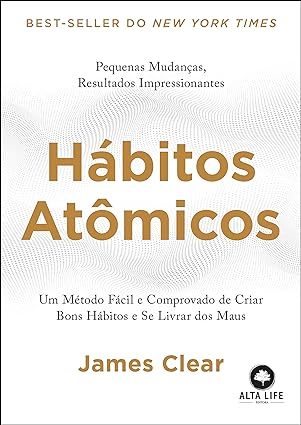
Pequenas mudanças, resultados impressionantes. Não importa quais sejam seus objetivos, Hábitos Atômicos oferece um método eficaz para você se aprimorar ― todos os dias. James Clear, um dos mais expoentes especialistas na criação de hábitos, revela as estratégicas práticas que o ensinarão, exatamente, como criar bons hábitos, abandonar os maus e fazer pequenas mudanças de comportamento que levam a resultados impressionantes. Se enfrenta dificuldades para mudar seus hábitos, o problema não é você, é o sistema escolhido. Os maus hábitos se repetem sem parar porque você está usando o sistema errado, e não porque não queira mudar.Assim, suas limitações não são a complexidade de seu objetivo, mas a inadequação de seus sistemas.
Neste livro, você aprenderá um método comprovado capaz de levá-lo a novos patamares. Clear é conhecido por sua habilidade em transformar tópicos complexos em comportamentos simples que podem ser facilmente aplicados à vida cotidiana e profissional. Seu método, desenvolvido a partir de conceitos comprovados da biologia, psicologia e neurociência, é um guia descomplicado para tornar os bons hábitos inevitáveis e os maus, impossíveis. Ao longo desta jornada, os leitores serão inspirados e entretidos por histórias de medalhistas de ouro em Olimpíadas, artistas premiados, líderes de negócios, médicos que salvam vidas e astros da comédia que usaram a ciência dos pequenos hábitos para dominar seu ofício e se lançar ao topo de suas áreas de atuação.
Saiba mais em:
#livros#dicas#dica de livro#autoajuda#hábitos#james clear#recomendação#book recommendations#books#books and reading#leitura#trecho de livro#frase de livro#citação de livro#dificuldades#superação#alegria#tristeza
5 notes
·
View notes
Quote
The most useful form of patience is persistence.
Patience implies waiting for things to improve on their own.
Persistence implies keeping your head down and continuing to work when things take longer than you expect.
James Clear
91 notes
·
View notes
Text
If you want to avoid criticism, create less.
If you want to avoid irrelevance, create more.
James Clear
4 notes
·
View notes